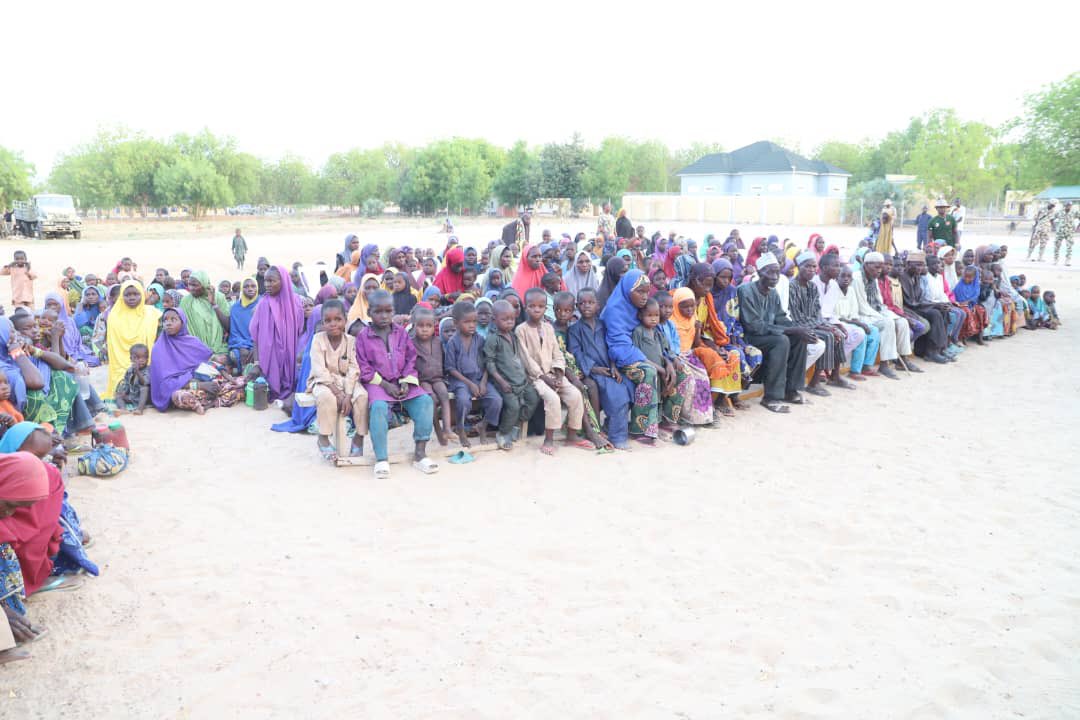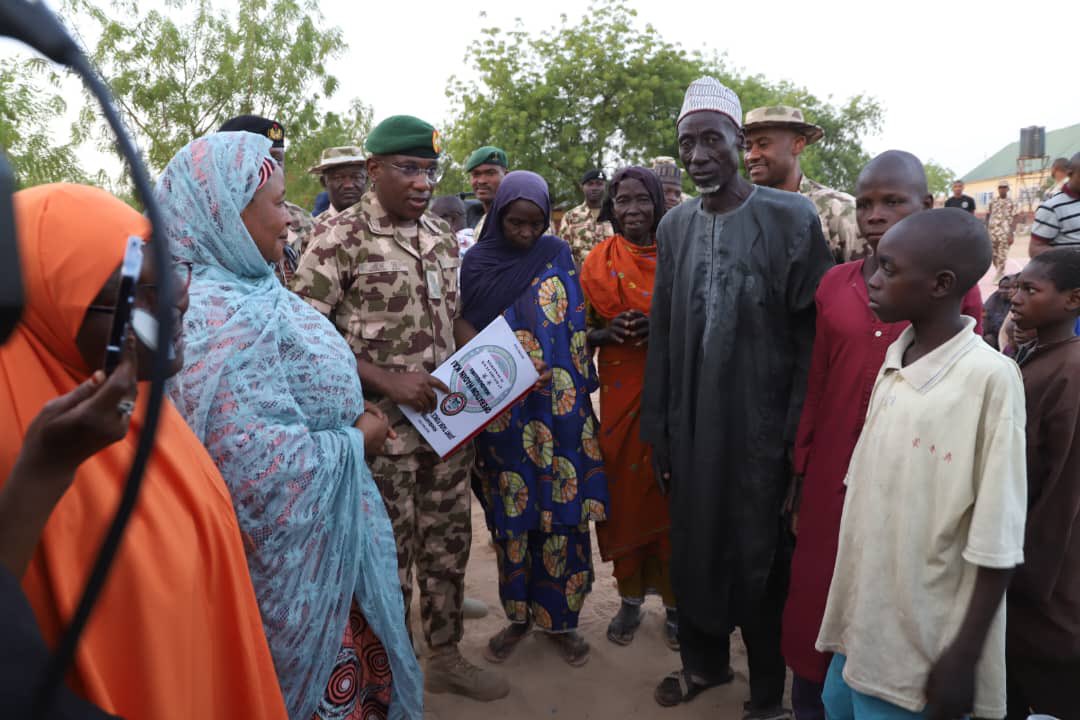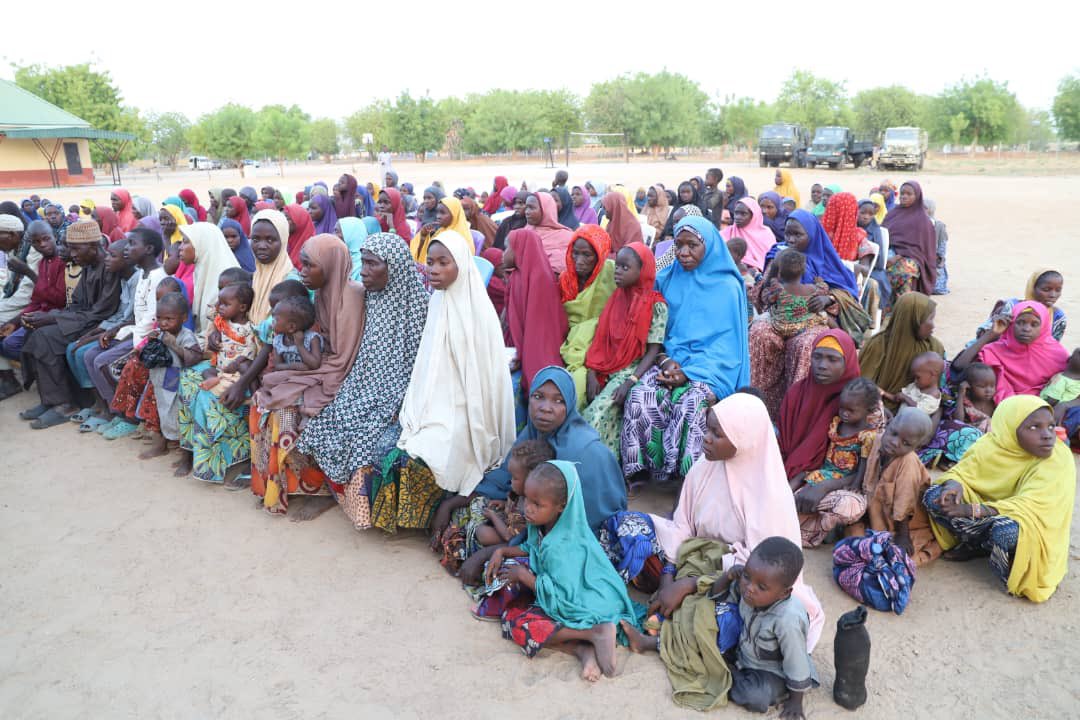The Nigerian Army has said that it has handed over some 350 kidnapped persons it rescued from kidnappers’ den to the State Government, Borno.
The Army made the claims in a press release it issued on Thursday, May 23, 2024.
In the statement, the Army stated that it will sustain onslaughts against terrorists across the country.
Is stated: “In a significant milestone achieved by the Joint Task Force North East (NE) Operation HADIN KAI (OPHK), the Headquarters Theatre Command has handed over 350 rescued civilians to the Borno State Government on May 20, 2024, at Maimalari Cantonment in Maiduguri.
“The civilians, comprising 6 adult males, 135 females, and 209 children, were rescued during a clearance and offensive operations by troops of OPHK in Sambisa Forest.”
The Deputy Theatre Commander, Major General Kenneth Chigbu represented the Theatre Commander at the event.
In his remarks, Major General Chigbu praised the troops for their professionalism.
He also appreciated international and local partners, as well as Borno State Government, for their support to military operations in the region.
The event, he noted, marked another significant milestone recorded by the Joint Task Force under the leadership of Major General Waidi Shaibu.
The State Director of Social Welfare, Ministry of Women Affairs, Hajjiya Y’arbauchi, received the rescued civilians on behalf of the Governor.
Y’arbauchi thanked the military for their coordinated efforts.
She announced that the rescued persons would be taken to Internally Displaced Persons Camp.
Therein, they will undergo profiling, medical checks, and skill acquisition training before returning to their families.
The Deputy Theatre Commander noted that the rescue added to the 44 persons recently handed over to the State Government by the Joint Task Force North.
This, he said, demonstrates the military’s commitment to protecting civilians and defeating terrorism in the region.
The event was attended by senior officers from Headquarters Theatre Command and 7 Division, as well as members of the Borno State Government.
Insecurity has remained a recurring issue across Nigeria, especially the North East and North West.
Here are some of the key points about the insecurity in northern Nigeria:
Boko Haram
- Northern Nigeria faces a daunting array of insecurity issues that are deeply rooted in socio-economic, political, ethnic, and religious tensions.
- All the three geopolitical zones in northern Nigeria are under intense insecurity with the operation of Boko Haram.
- The security situation in Nigeria has become increasingly complex and uncertain due to various non-state armed groups.
- Victory against Boko Haram and the Islamic State remains elusive and security in northeastern Nigeria has significantly deteriorated since 2017.
- Insecurity has also spread to northwestern Nigeria with the farmers-herders’ conflict.
This is compounded by the intensifying effects of global warming and remains dormant at best.
Bandits
Bandits have contributed immensely to the insecurity menace gnawing at northern Nigeria.
Here are some of the key points about the insecurity posed by Bandits in northern Nigeria:
- The bandit conflict in northwest Nigeria is an ongoing conflict between the country’s federal government and various gangs and ethnic militias.
- Starting in 2011, the insecurity remaining from the conflict between the Fulani and Hausa ethnic groups quickly allowed other criminal and jihadist elements to form in the region.
- The origins of the bandit conflict can be traced back to herder–farmer conflicts that plague Nigeria.
- Environmental decline and the scarcity of water and arable land led to communities competing viciously for those limited resources.
- Unemployment, large-scale poverty, and weak local government have allowed for a steady stream of desperate people turning to criminal activity to earn a living.
Fulani herdsmen
Another group that has presided over the realms of insecurity, especially kidnapping and wanton killings are the Fulani herdsmen.
This groups have contributed in diverse ways to the insecurity threatening the peace of the country across carious regions and states.
The issue of Fulani herdsmen and insecurity in Nigeria has become a complex and sensitive topic.
Here are some key points:
- The Fulani herdsmen, largely nomadic pastoralists, have been involved in conflicts with farming communities over land and resources, leading to violence and insecurity.
- The conflict has roots in environmental degradation, population growth, and competition for scarce resources.
- Some Fulani herdsmen have been linked to armed attacks, killings, and kidnappings, causing widespread fear and displacement.
- The Nigerian government has been criticized for its handling of the issue, with some accusing it of bias and inadequate response.
- Efforts to address the issue include initiatives to modernize pastoralism, improve livestock management, and enhance security presence in affected areas.
- The conflict has significant humanitarian, economic, and political implications for Nigeria and the region.
Nigerians, both government and the populace, strive to approach this topic with nuance and understanding.
They also struggle to recognize the complexities and multiple perspectives involved.










